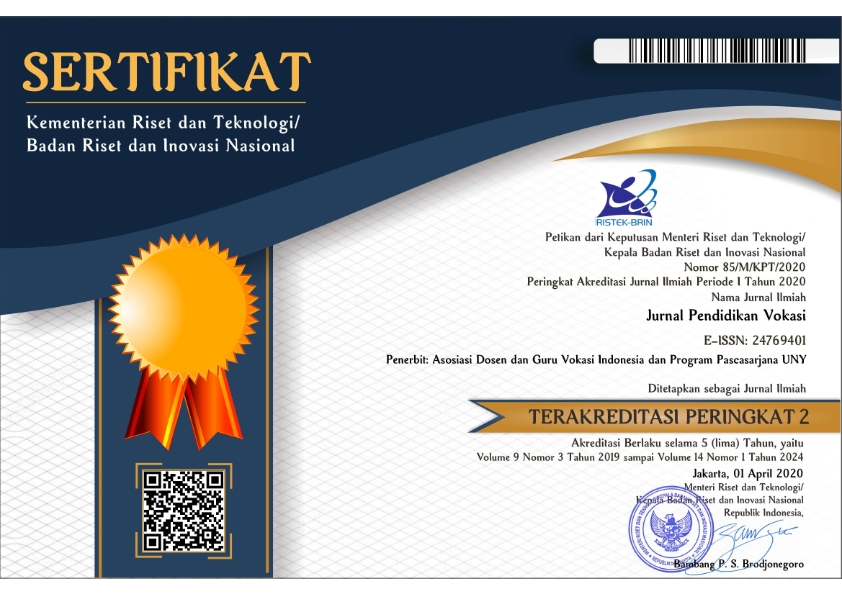Islamic Boarding School based vocational education: a case study on SMK Syubbanul Wathon Tegalrejo Magelang
DOI:
https://doi.org/10.21831/jpv.v7i3.12450Keywords:
vocational education, islamic boarding school, SMK Syubbanul WathonAbstract
This study aims to: (1) describe the conception of vocational education by the Islamic boarding school community; (2) describe the education system at SMK Syubbanul Wathon Tegalrejo Magelang. The study was conducted at SMK Syubbanul Wathon Tegalrejo Magelang using qualitative approach of a case study. The data collection used interviews, participant observation, and documents. The research informants consisted of the chairman of the foundation of Syubbanul Wathon, the caretakers, the principal, the vice principal, the teachers, the cleric, and the students. The results of the study were: (1) The conception of vocational education by Islamic Boarding School community is ngluru ngilmu which means sincerity between teachers and students, (2) The system of vocational education based on Islamic boarding school in SMK Syubbanul Wathon Tegalrejo Magelang include: (a) the context: SMK Syubbanul Wathon Tegalrejo Magelang has internalized the dynamics of context into formulation of school vision, mission, goals, and activities; (b) input: SMK Syubbanul Wathon Tegalrejo Magelang applies KTSP and Islamic boarding school curriculum; (c) process, SMK Syubbanul Wathon Tegalrejo Magelang integrates the school and Islamic boarding school system; (d) output, SMK Syubbanul Wathon Tegalrejo Magelang graduates have vocational skills, strong religiosity, independence, discipline and skills in foreign languages; (e) outcome: 44% of SMK Syubbanul Wathon Tegalrejo Magelang graduates worked, 42% went to college, and 14% went to salaf boarding school or entrepreneurship.
References
Abubakar, M. (2012). Vocational islamic boarding school as one of alternative development institute of islamic education. In Internasional AnnualInternationalConferenceof Islamic Studies (AICIS) ke 12 (pp. 258–273). Surabaya. Retrieved from http://www.academia.edu/5141077/Pesa ntren_Kejuruan_sebagai_salah_satu_alte rnatif_pengembangan_lembaga_Pendidi kan_Islam
Agustian, A. G. (2003). Rahasia sukses membangkitkan ESQ power. Jakarta: Arga.
Amrizal. (2011). Sekolah vs Islamic boarding school: sebuah perbandingan menuju format baru mainstream lembaga pendidikan nasional peniada dikotomik. Jurnal Sosial Budaya, 8(1), 116–131.
Bogdan, R. C., & Biklen, S. K. (2007). Qualitative research for education: an introduction to theories and metdods (5th ed.). Boston: Pearson Education.
Depdiknas. Undang-Undang Nomor 20 Tahun 2003 tentang Sistem Pendidikan Nasional (2003). Jakarta.
Direktorat Pembinaan SMK Kementerian Pendidikan dan Kebudayaan. (2014). Panduan Pelaksanaan Tahun 2014: Bantuan Pembangunan SMK berbasis Komunitas/Islamic boarding school. Jakarta: Direktorat Pembinaan SMK Kementerian Pendidikan dan Kebudayaan.
Hasanudin, A. (2015). Peluang dan tantangan menuju masyarakat ekonomi ASEAN (ASEAN Economic Community 2015). In Seminar Nasional Gemilang Pendidikan Vokasi. Yogyakarta: Fakultas Teknik Universitas Negeri Yogyakarta.
Hollander, A., & Mar, N. Y. (2009). Towards achieving TVET for all: The role of the UNESCO-UNEVOC international centre for technical and vocational education and training. In R. Maclean & D. Wilson (Eds.), International handbook of education for the changing world of work (pp. 41–57). Bonn: Springer.
Jacobs, P. (2015). Creating pathways to enhance college to work transitionusing COMET competence diagnostic model to assess and develop occupational competence and commitment in Technical Vocational Education and Training (TVET). In E. Smith, P.
Gonon, & A. Foley (Eds.), Architectures for Apprenticeship. Melbourne: Australian Scholarly Publishing.
Lukens-Bull, R. A. (2001). Two sides of the same coin: modernity and tradition in islamic education in Indonesia. Anthropology & Education Quarterly, 32(3), 350–372. Retrieved from http://www.jstor.org/stable/3195992
Maclean, R., & Wilson, D. (2009). International handbook of education for the changing world of work, bridging academic and vocational learning. Bonn: Springer.
Mason, J. (2002). Qualitative researching. London: SAGE Publications Ltd.
McKinsey Global Institute. (2012). The archipelago economy: unleashing Indonesia's potential.
Menteri Pendidikan Nasional. Peraturan pemerintah republik indonesia nomor 19 tahun 2005 tentang standar nasional pendidikan (2005).
Merriam, S. B. (1998). Qualitative research and case study application in education. San Francisco: Jossey-Bass Publishers.
Miles, M. B., & Huberman, A. M. (1994). Qualitative data analysis. New Delhi: SAGE Publications.
Mutohar, A., & Anam, N. (2013). Manifesto modernisasi pendidikan Islam & Islamic boarding school. Yogyakarta: Pustaka Pelajar bekerjasama dengan STAIN Jember Press.
Nuh, M. (2014). SMK ponpes siapkan pemimpin berbasis "grassroots." Retrieved March 28, 2014, from http://litbang.kemdikbud.go.id/index.php/berita-bulan-maret-2014/763- mendikbud-smk-ponpes-siapkan- pemimpin-berbasis-grassroots
Slamet. (2008). Desentralisasi pendidikan di Indonesia. Jakarta: Depdiknas.
Sudira, P. (2011). Praksis ideologi Tri Hita Karanadalam pembudayaan kompetensi pada SMK di Bali. Disertasi, unpublsihed. Universitas Negeri Yogyakarta.
Sudira, P. (2012). Filosofi dan teori pendidikan vokasi dan kejuruan. Yogyakarta: UNY Press.
Sugiyono. (2012). Metode penelitian kuantitatif, kualitatif, dan R&D. Bandung: Alfabeta.
Supriadi, D. (2002). Sejarah pendidikan teknik dan kejuruan di Indonesia: Membangun manusia produktif. Jakarta: Departemen Pendidikan Nasional, Direktorat Jenderal Pendidikan Dasar dan Manengah, Direktorat Pendidikan Menengah Kejuruan.
Wibawa, B. (2005). Pendidikan teknologi dan kejuruan: manajemen dan implementasinya di era otonomi. Surabaya: Kertajaya Duta Media.
Yuli, N. G., Haningsih, S., & Adikrishna, R. (2011). The common room design of islamic boarding school: A preliminary research in yogyakarta islamic boarding school. International Journal of Engineering & Technology IJET-IJENS, 11(4), 127–134. Retrieved from https://docs.google.com/viewer?url=http%3A%2F%2Fijens.org%2FVol_11_I_0 4%2F116304-4747-IJET-IJENS.pdf&pdf=true
Downloads
Published
How to Cite
Issue
Section
License
The authors submitting a manuscript to this journal agree that, if accepted for publication, copyright publishing of the submission shall be assigned to Jurnal Pendidikan Vokasi. However, even though the journal asks for a copyright transfer, the authors retain (or are granted back) significant scholarly rights.
The copyright transfer agreement form can be downloaded here: [JPV Copyright Transfer Agreement Form]
The copyright form should be signed originally and sent to the Editorial Office through email to jpvokasi@uny.ac.id
Jurnal Pendidikan Vokasi by http://journal.uny.ac.id/index.php/jpv is licensed under a Creative Commons Attribution-ShareAlike 4.0 International License.














